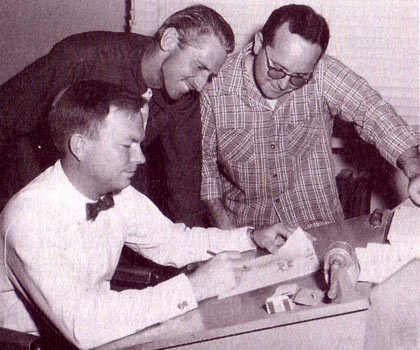
We’re taking a closer look today at the work of Ben Washam (1915-1984), a close collaborator of director Chuck Jones and one of the greatest animators of the classic Looney Tunes and Merrie Melodies shorts.
Washam was an obvious talent from the very beginning. As a young man in the 1930s, he designed the Big Boy mascot on a napkin in exchange for a free lunch. The restaurant chain Frisch’s Big Boy still uses a redrawn version of the character Washam designed as their trademark to this day.

Washam animated so many unforgettable scenes over the years, from Bugs Bunny rubbing Elmer’s head in Rabbit of Seville (1950) to Daffy Duck charting a course to Planet X in Duck Dodgers in the 24½th Century (1953).
This bit from Operation: Rabbit (1952), in which Bugs meets Wile E. Coyote for the first time, has to be one of the greatest things ever animated. Bugs’ sarcastic facial expressions floor me every time I watch this short.
— Cartoon Study (@CartoonStudy) April 4, 2024
It’s harder to distinguish individual animators in Chuck Jones cartoons than it is in the work of some other directors (Jones drew extensive character layouts for his films, and his personal drawing style dominates the look of his cartoons). But Jones still gave his animators enough leeway to inject their own personalities into the work. There are many hallmarks of Washam’s drawing style – big pupils, cheeks with lots of baby fat – but one clear identifiable quirk of Washam’s is how he drew Bugs Bunny’s buck teeth: he always had them end in a point. If you see Bugs with pointy teeth, as he has here in My Bunny Lies Over the Sea (1948), you can bet that Washam was behind it.
— Cartoon Study (@CartoonStudy) April 4, 2024
The Looney Tunes cartoons are famous for their slam-bang slapstick – and justifiably so – but what makes the comedy so rich is the complexity of the acting. Washam was the master at those tenuous little expressions and gestures that made the characters feel real. Chuck Jones once called Washam “a truly great animator, one of the most sensitive, one of the most subtle.” Every single aspect of this classic scene from Duck! Rabbit! Duck! (1953) is brilliant, but look at the naturalism of the way Bugs casually scratches his nose as he’s spelling out the word “duck.” Both Bugs and Daffy are just so convincingly alive here without sacrificing any cartoony exaggeration.
— Cartoon Study (@CartoonStudy) April 4, 2024
There’s a cheerful friendliness to Washam’s work, which adds up as he was one of the nicest people in the animation industry. For years, he taught young artists how to animate at his home, completely free of charge, explaining, “Animation has been good to me, and I want to give something back.” He fought social injustice all his life, and in the mid-1950s, he got his friend Frank Braxton hired at Warner Bros., making Braxton Hollywood’s first Black animator. Washam was always generous in sharing his knowledge of character animation, a subject few people understood as well as him. You can see that knowledge at work in this Chaplinesque pantomime scene from Homeless Hare (1950).
— Cartoon Study (@CartoonStudy) April 4, 2024
Washam’s accomplishments are numerous: he was president of the Screen Cartoonist’s Guild for two terms, and he came up with Daffy Duck’s classic line in Duck Amuck, “Thanks for the sour persimmons, cousin.” He also animated a cartoon entirely by himself: Rabbit Rampage (1955), in which Bugs Bunny interacts with the animator drawing him.
— Cartoon Study (@CartoonStudy) April 4, 2024
Last but not least, this Washam clip from How the Grinch Stole Christmas! (1966) will outlive us all.
— Cartoon Study (@CartoonStudy) April 4, 2024
Discover more from reviewer4you.com
Subscribe to get the latest posts to your email.





